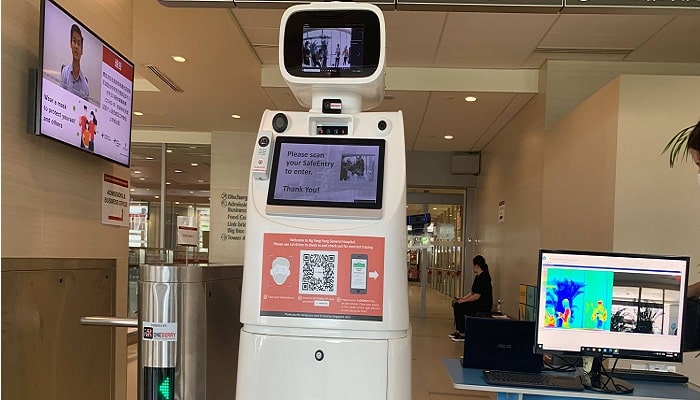A new approach to hospital management will see the National University Health System (NUHS) make use of drones, robots and touch-free technology on its various campuses.
Speaking to reporters on Thursday (Sep 24), NUHS chief operating officer Ng Kian Swan said that these new types of technology would serve to further improve operations. “Hospitals are important assets, and there’s this continuing need to make it safer, smarter and of course, greener,” he said.
“By leveraging on technology and IoT (Internet of things) and AI (artificial intelligence) it helps us to drive efficiency, productivity, safety, and most importantly, it also provides a platform for us to upskill our fellow colleagues … it is actually preparing a future-ready workforce, to support the workforce in operations.”
NUHS comprises healthcare institutions such as Alexandra Hospital, Ng Teng Fong General Hospital, Jurong Community Hospital and National University Hospital (NUH).
One way in which NUHS plans to leverage technology to bolster operations is through the use of drones, said Mr Ng.
“For drones, it replaces the conventional way of putting up gondolas, scaffolding, to do building inspection(s). It is expensive, time consuming and to a certain extent, not so accurate,” he said.
“By using drones, you can reach out to any part of the building, take photos and (it) gets transmitted to the engineers. And If there are problems to fix immediately, we can do it.”
The use of drones to conduct building inspections has been rolled out since October last year, with Alexandra Hospital, Ng Teng Fong General Hospital and NUH having gone through two rounds of inspections. These checks will be done quarterly.
This will mean more frequent and regular inspections to ensure the upkeep of the hospitals’ facade and reduce the risk of issues such as cracks, stain marks and falling objects from roof gutters and louvres, added NUHS in a media release.
NUHS will also pilot the use of drones to conduct security surveillance and patrol various hospital premises, monitoring areas with “critical facilities” such as power plants and water tanks, said Mr Ng.
This has been rolled out at all three hospitals as well.
ACTING AS DETERRENCE
In addition to drones, NUHS is also rolling out the use of autonomous security robots to complement security teams in patrolling facilities.
“This is to support the security operations and to act as a deterrence. We are working with the partners to incorporate some of the functional requirements, including allowing visitors to have their temperature taken,” said Mr Ng.
One of the robots which can help detect potential security incidents, and transmit data back, will be rolled out at Ng Teng Fong General Hospital next month.
Another robot which helps in temperature taking and scanning for safe entry will be rolled out between November and December at NUH.
Hospital employees will be sent for courses to learn how to operate some of these new technologies.
“At this stage, it is more of using robots, drones to support the way they work. At the same time, upskilling them. Upskilling to us is very, very important because technology is something that is moving very fast,”said Mr Ng.
And in terms of running a hospital operations for us … this is one point that I always discuss with my colleagues and we should continue to use technology to drive efficiency and operations.”
Mr Ng also noted how the current COVID-19 pandemic also has thrown up manpower-related issues, and such new technologies can help address these problems.
“COVID-19 actually surfaced a very challenging issue – the dependence on manpower. And by leveraging on these technologies … it improves efficiency. At the same time, it lessens the need for manpower and to us in NUHS, it’s something that’s pretty important and we will continue to use technology to support our hospital operations.“
Another feature which NUHS plans to unveil is touch-free technology in the form of non-contact buttons lifts. This will help improve infection control and reduce the transmission of bacteria or viruses, especially during the current pandemic, said NUHS.
This will be introduced in selected lifts at NUHS campuses by March next year.


















